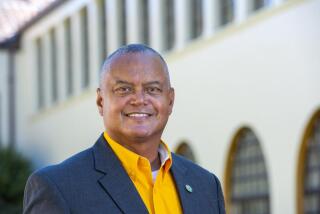Jackson Delivers a Challenge to Students : Speech: In Compton, he reminds them of the role of black youths in ending America’s ‘legal apartheid.’ He exhorts the new generation to believe in itself.
Young students played a pivotal role in forging America’s history during the civil rights movements of the 1950s and ‘60s, urging improvements in a nation that had once stood as two separate societies, the Rev. Jesse Jackson told a packed gymnasium in Compton on Monday.
Jackson, whose speech helped kick off Black History Month at Centennial High School, told about 1,400 students that they should hope to do no less through determination and out of self-respect.
Four students who dared to enter a Woolworth’s store 33 years ago to buy hamburgers “helped to snatch down the cotton curtain of legal apartheid segregation in our country,” Jackson told the high school students.
“Young America came alive and with a great sense of dignity and discipline began to fight back and make America better,” the civil rights leader said. “The walls that those students pulled down . . . changed the course of our whole nation.”
The students cheered loudly before Jackson began his speech and gave him a red-and-black knit hat, scarf and T-shirt with the school’s Apaches insignia.
But once Jackson got into his address, telling of an America 30 years ago where blacks could not use the same restrooms as whites or get service in some restaurants, the students sat quietly.
The drums and horns of the school’s marching band that had triumphantly heralded the start of his speech were silent.
Surrounded by signs on the gymnasium walls proclaiming “We Love You Jesse,” Jackson urged the Latino and black students to believe they are “somebody.”
“People who believe that they are somebody behave that way,” Jackson said. “And early on, they learn to treat other people as though they are somebody. And pretty soon self-respect and self-worth comes and takes us, and there is a sense of dignity that permeates the air.”
The forces that impeded African-Americans during and before the civil rights era were external, said Jackson, who told the students several times to think of their minds as pearls.
“The biggest threat to our lives is internal,” he said. “It’s brothers killing brothers. It’s sisters killing sisters. It is the loss of will to fight for self-respect and self-determination and now to surrendering with your mouths to self-destruction.”
Jackson asked the teen-agers to have focus in their lives, to avoid the lure of drugs and to become beacons of peace during the upcoming federal trial of four police officers charged in the Rodney G. King beating.
“We really do need peace. L.A. was really torn apart after this Rodney King beating,” said drum majorette Channette Higgins, 16.
Higgins said she was glad to see that Compton stores destroyed during the rioting were being rebuilt.
James Caldwell III, 16, a horn player in the marching band, said he agreed with Jackson that “we need to stop the violence. We’re killing each other, and it’s got to come to an end.”
“After what he said, everyone should have their thoughts on how they should live,” said Davon Fowler, 18, a member of the school’s student council.
Many of the students said Jackson’s speech gave them hope that their dreams could come true.
Said Higgins: “Everything he said was true. You can be whatever you want to be in life.”
Over the weekend, Jackson met with National Football League officials assembled for the Super Bowl, urging that they hire more minorities for front-office jobs.
More to Read
Sign up for Essential California
The most important California stories and recommendations in your inbox every morning.
You may occasionally receive promotional content from the Los Angeles Times.










